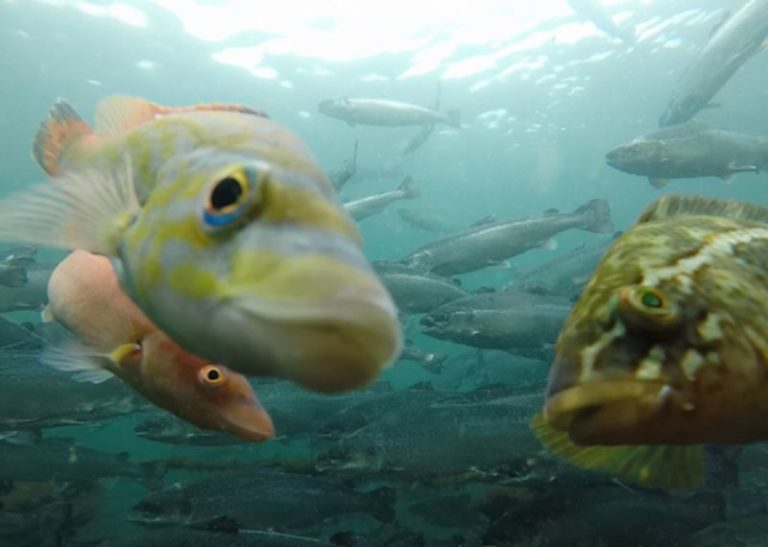Cleaner fish (or companion fish) are now commonly used in salmon farming around the world (See image of wrasse in our salmon pens – they are curious fish and are coming up to the Go-Pro for a look)!
The principle behind it is that the cleaner fish eat any parasites such as sea lice which may settle on farmed salmon. The same way that ladybirds control aphids on commercially grown plants.
When young farmed salmon go to sea they come from fresh water and, as sea lice cannot live in freshwater, the fish are sea lice free. Over the next months, as wild stocks pass by, sea lice migrate from wild fish to the farm stock. Cleaner fish (or companion fish) are used by Loch Duart and other salmon farmers to graze on any sea lice that might settle on farmed salmon stock from surrounding waters. The use of cleaner fish is a non-medicinal approach to sea lice control. There are two types of cleaner fish being used and both are obviously only used as they are native to Scottish waters. The most effective species are ballan wrasse (Labrus bergylta) and the lump fish (Cycloptus lumpus).
Loch Duart has been using wrasse as cleaner fish since 2014 with tangible results and has a dedicated team of staff trained in cleaner fish care led by the Cleaner Fish Coordinator. The wrasse come from wild catch fisheries and hatcheries. Loch Duart has its own lumpfish breeding programme with the ambition to become self-sustaining in the future.
The movement of every cleaner fish is handled with great care by Loch Duart staff, not only in the sense of duty of care for the fish but also in making sure there is no disease transfer and parasitic transfer. Batches of cleaner fish go through intense screening prior to acceptance by Loch Duart and then approval for transport to the farm.
Lewis Bennett, Cleaner Fish Coordinator for Loch Duart, said:
“Loch Duart’s approach to aquaculture means that fish welfare and environmental stewardship are paramount in designing our farming methods. As a non-medicinal approach to managing sea lice cleaner fish have proven to be a highly effective and sustainable method. We are very encouraged by our cleaner fish breeding at our farm in Sutherland. We work closely with relevant authorities and conservation groups to support the development of regulation to protect indigenous cleaner fish species around the coast.”

